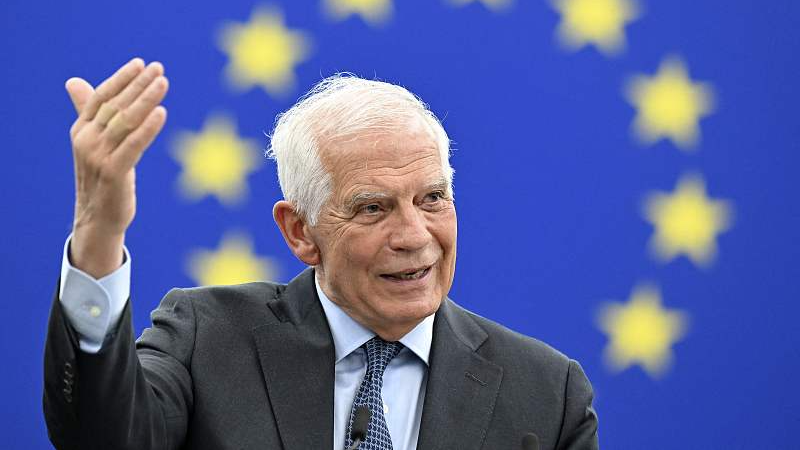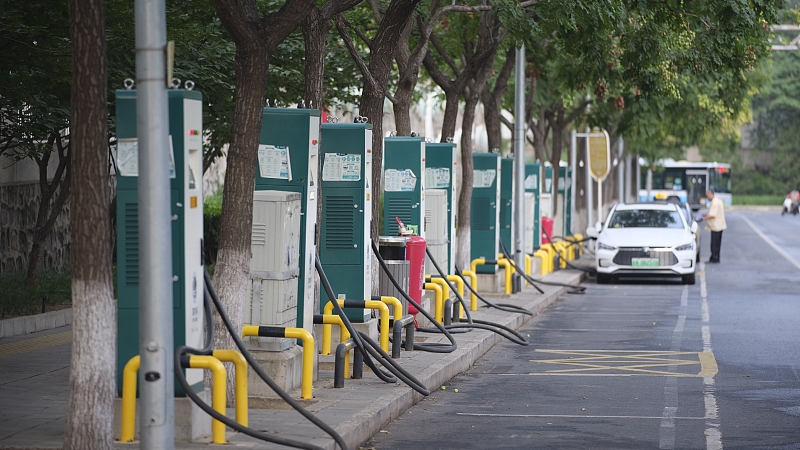
Josep Borrell, High Representative of the European Union for Foreign Affairs and Security Policy. /CFP
Josep Borrell, High Representative of the European Union for Foreign Affairs and Security Policy. /CFP
Editor's note: Farhad Chowdhury, a special commentator for CGTN, is a security and strategic affairs researcher and columnist. The article reflects the author's opinions and not necessarily the views of CGTN.
A glimmer of optimism is raised by EU foreign policy Chief Josep Borrell's trip to China that it may address the EU's protectionist and 'de-risking' moves with China. The European Commission's move to probe into Chinese-subsidized electric vehicles on October 4 is the latest indicator of EU protectionism increasing rapidly. China strongly expressed dissatisfaction over the probe, vowing to safeguard Chinese companies. This clearly signals that China would not tolerate aggressive approaches.
It is now time for senior EU officials including Borrel to take China's concerns into account. In the case of the EU's bilateral ties, Joseph Borrel may make a significant contribution as one of the prominent policy makers in the EU. If the EU addresses China's concerns, it may return to pragmatically resolving differences.
Borrell and Chinese Foreign Minister Wang Yi co-chaired the 12th EU-China Strategic Dialogue to talk about bilateral ties and foreign and security policy problems. Besides these, it is expected that Borrel will play a positive role to fix unjustified protectionism against China and stop any kind of trade war. Despite some bilateral issues, the visit shows that the EU values bilateral economic and trade relations. The EU hopes to use Borrell's visit to resolve economic tensions and build political trust with China.
Since the far-right anti-China hawks in the EU parliament, and even the U.S. as an external influencer, have recently increased pressure on the EU to adopt a position against China, this visit must work as a spark for positive momentum in China-EU ties.
The EU's proposed measures are blatant protectionism in the name of fair competition and will severely disrupt and distort the global automotive industrial and supply chain, including the EU's, and hurt China-EU economic and trade relations. In spite of being a dedicated supporter of the WTO, the EU has started to oppose the WTO's free and open trade policy.
It seems that the EU seeks to promote a zero-sum competition rather than win-win collaboration, which is not the appropriate approach for international commerce. The EU move may prompt tit-for-tat trade actions between the two biggest trade partners, split the world, and undermine the climate fight, hurting everyone. Instead of unilaterally employing economic and trade measures, the EU should adopt an objective perspective. The Chinese and European car industries have great room to collaborate.
The move could threaten China-EU green technology collaboration. The EU's market openness promise must be implemented to provide Chinese enterprises a fair, impartial, and non-discriminatory business environment. Restricting goods by origin would violate EU WTO obligations. Protectionism can only lead to technical bifurcation and a trade war. The EU needs to recall that Chinese EV producers have gained market share due to a "substantial industrial edge" in the domestic and internal market, not state subsidies. The EV market in China is developing for strong demand and competitiveness. Chinese EVs are popular not only in Europe but also South Asia, and the Middle East. Chinese EVs are well-liked abroad and are particularly eco-friendly. People choose them because of their functionality and service.

Public charging facilities on a street in Beijing, September 3, 2022. /CFP
Public charging facilities on a street in Beijing, September 3, 2022. /CFP
The EU's market protection measures are illogical for consumers' rights, yet they raise worries about trade obstacles and consumer harm. Chinese electric automobiles may become more affordable, helping the worldwide move to renewable energy. However, protectionist policies may limit these advantages. Through its EVs, China has made an international green contribution. For eight years, China has led the world in new energy vehicle (NEV) sales, rising 93.4 percent to 6.89 million units in 2022. This should be celebrated as excellent progress in addressing the most pressing global issue of climate change, not demonized or undercut by the European Commission.
China and the EU have had frequent encounters in recent weeks, including a senior officials meeting, a high-level dialogue on trade, digital, and environmental protection, and several successes and consensus. Economic cooperation between China and the EU is still based on conversations and exchanges, not "decoupling."
At the 10th High-level Economic and Trade Dialogue, China and the EU reached several consensuses and improved their pragmatic relations. Instead of taking protectionism, de-risking and decoupling approaches to China, the EU needs to be pragmatic in closing the gaps and increasing the gains between Beijing and Brussels.
It's inevitable that the two sides might have disagreements, but both sides should allow them to work together in their shared ground on which they may collaborate in many areas. China and EU economic and trade collaboration in recent decades has created the groundwork for future cooperation. The EU and China must work to make their bilateral relations more productive in the light of global uncertainty.
The problem may be resolved by bilateral discussions and negotiations. Promoting Chinese EV firms to build plants in Europe is a great opportunity for China-Europe collaboration. More China-Europe dialogues are needed to properly capitalize on the global auto industry shift. Europe should avoid protectionism. Borrell needs to be aware of this and assist EU authorities in comprehending the negative effects of their purported trade protectionism.
(If you want to contribute and have specific expertise, please contact us at opinions@cgtn.com. Follow @thouse_opinions on Twitter to discover the latest commentaries in the CGTN Opinion Section.)